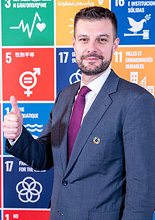DA alumnus Miladin Bogetic on his career since graduating from MAIS 08 in 2005
 I was a ten-year-old boy when the country in which I was born – Yugoslavia – started to fall apart. Not long after, a war began in my hometown – Sarajevo. My family fled to Montenegro, and we went on to rebuild our lives there.
I was a ten-year-old boy when the country in which I was born – Yugoslavia – started to fall apart. Not long after, a war began in my hometown – Sarajevo. My family fled to Montenegro, and we went on to rebuild our lives there.
I believe that my interest in international relations, diplomacy, and politics started around that time. Seeing the failure of national, regional, and global “leaders” to prevent a bloody conflict in the Balkans instilled a certain curiosity in me. I was an avid follower of news on TV and a reader of newspapers already from my early teens. I started learning foreign languages around the same time, first English, then Russian and Italian, and some years later Bulgarian, German, French, Spanish. I joined a local debate club and practiced both critical thinking and public speaking.
Winning a full Open Society Foundation scholarship to study at the American University in Bulgaria, the first liberal arts college in the Balkans, opened many doors and marked the following 20 years of my life. I graduated with summa cum laude in Political Science and International Relations and immediately went on to do a Master’s programme at the Johns Hopkins University – School of Advanced International Relations (SAIS) in Bologna. SAIS had a joint degree programme with the Diplomatische Akademie Wien - Vienna School of International Studies, which is where I came for the second year of my Master’s, directly joining the 8th MAIS. I wanted to stay in Europe at that time, and focus on international organizations, and the DA provided a perfect match.
My year at the DA was an amazing experience, both academically and socially. I learned a lot and made friends for life. Just this week in Sarajevo I met with two DA alumni, who had become good friends over the years. As importantly, Vienna provided an excellent hub for networking and learning first-hand about different international organizations. The same year I graduated from the DA I got my first internship – at the Organization for Security and Cooperation in Europe (OSCE), first in its Mission in Bosnia and Herzegovina, and then at the Conflict Prevention Center at OSCE’s HQ in Vienna.
In May 2006, Montenegro renewed its independence, peacefully separating from Serbia and turning a new page in its long history. I returned home after seven years abroad and joined the Foreign Ministry, as one of the ten young diplomats hired shortly after the referendum. Those years were very exciting – building a new diplomatic network and establishing a new country on the global stage. I grew a lot at the Foreign Ministry, where I stayed for 3.5 years, both at HQ in Podgorica and at Montenegro’s Mission to the UN and the OSCE in Vienna.
Around that time, I passed a National Competitive Recruitment Examination (NCRE) to join the United Nations and was offered a position of an Associate Political Affairs Officer at the UN peacekeeping mission in south Lebanon. The learning curve was very steep during the three years I spent in Lebanon; I thought the Balkans was complicated, and then I discovered the Middle East!
Part of the NCRE programme was a mandatory rotation, which brought me to Geneva, Switzerland in 2013. I moved from political affairs to communications and started to work at the largest UN office outside of New York. While the fieldwork in Lebanon gave me a lot of exposure to the intricacies and nuances of the Lebanese-Israeli conflict, in Geneva I acquired a larger picture of global affairs, particularly in the fields of human rights, humanitarian affairs, and disarmament, the three topics I was mostly involved with.
In 2017 and 2018, I took a pause from my UN career and went to Ukraine to be the spokesperson for the International Committee of the Red Cross (ICRC). The year and a half I spent there reminded me of the conflict in former Yugoslavia and brought back some sad memories, but it was very gratifying to be part of a team that was helping people in need. I enjoyed interacting with beneficiaries in eastern Ukraine and telling their stories to the world.
Now, back at UN Geneva, I am looking forward to new challenges within the United Nations. I am still particularly interested in the intersection of communications and political affairs, which I view as the two sides of the same coin: good negotiators and political analysts need to know how to communicate and discern information from various sources, and good communicators need to have a solid understanding of global affairs. I believe I can be both.
[May 2021]